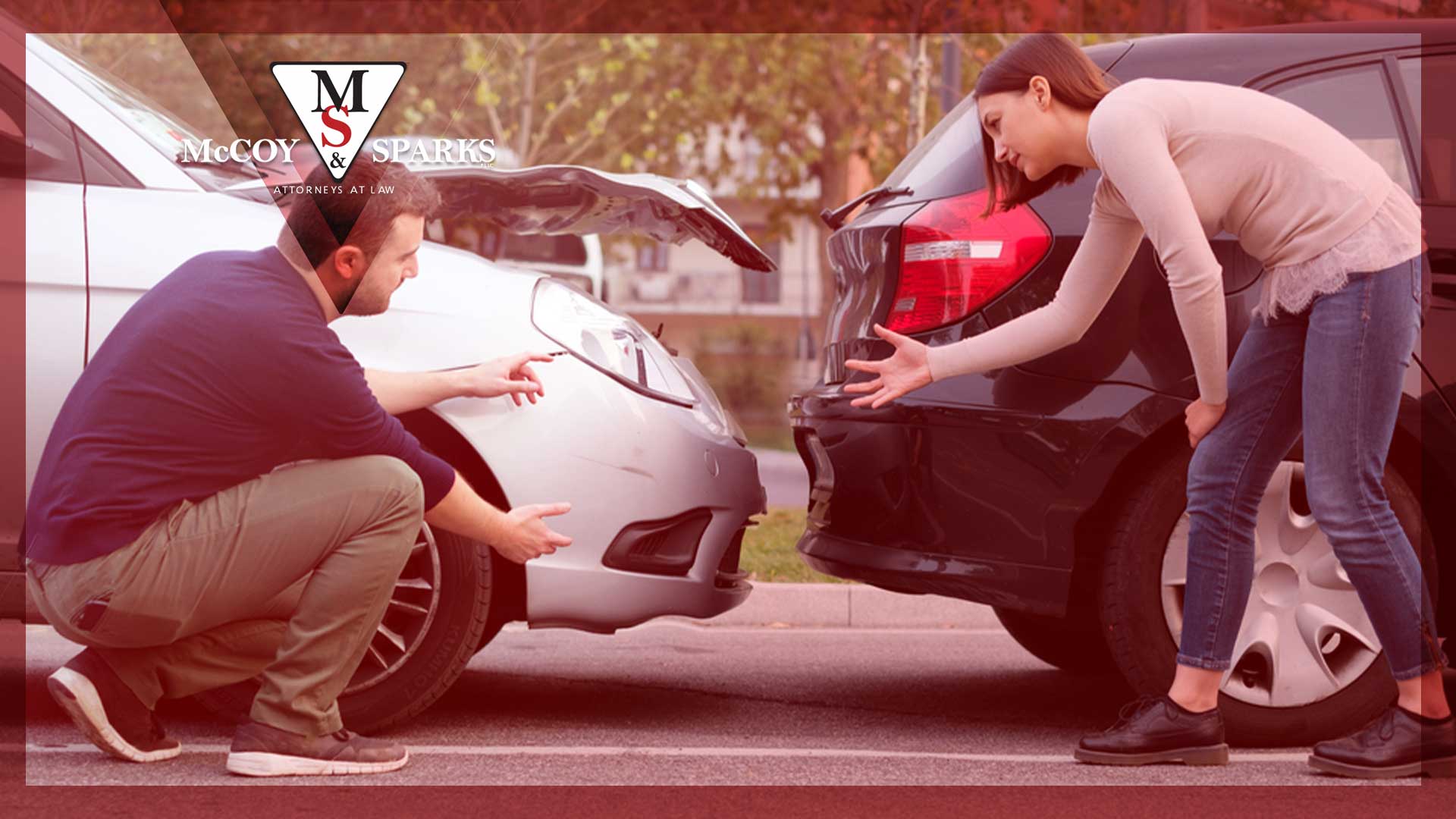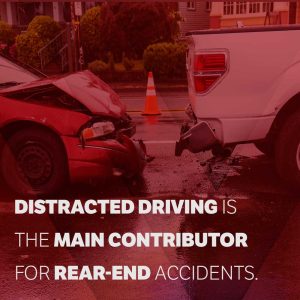
What You’ll Learn in this Article:
- Rear-end collision accident statistics
- Common causes of rear-end accidents
- What to do after a rear-end collision
- Common injuries from rear-end accidents
Rear-end collisions are common and deadly. Being rear-ended can cause serious or even fatal injuries to accident victims, including traumatic brain injuries, spinal cord injuries, and other catastrophic injuries. More commonly, rear-end collisions result in minor injuries, such as soft tissue injuries and simple bone fractures.

Kentucky drivers need to practice caution behind the wheel to avoid these crashes, but the unfortunate reality is that you may still experience a rear-end collision at some point through no fault of your own.
If a negligent driver causes your rear-end car accident, you can file a claim to pursue compensation for out-of-pocket costs, such as medical expenses. Your accident injuries may require extensive treatments that surpass your personal injury protection (PIP) coverage. For that reason, it’s important to file a claim and work with a car accident attorney who can help you.
If you have further questions or need help filing a claim, don’t hesitate to contact the experienced car accident attorneys at McCoy & Sparks to recover compensation.
Rear-End Collision Statistics
According to the National Highway Traffic Safety Administration (NHTSA), 28% of all traffic accidents are rear-end collisions, meaning that nearly 1/3 of all accidents are rear-end crashes. Rear-end accidents cause thousands of collisions in our state every year, numerous of which result in serious injuries or death to drivers and passengers.
What Causes Rear-End Collisions?
In order to reduce your risk of suffering from a rear-end accident, it’s important to know why these crashes happen. Of course, you can’t prevent them entirely, but you can avoid causing them yourself.
Here are the most common reasons why a rear-end accident occurs:
Distracted Driving

Distracted driving is the main contributor for rear-end accidents. The NHTSA stated that driving while distracted contributed to 60% of rear-end collisions. The reason why this is so common is because distracted drivers often fail to notice stopped or slowing vehicles in front of them, causing a rear-end collision.
Types of distracted driving include:
- Visual Distractions: These distractions involve looking away from the road. Examples include looking a smartphone and staring at a navigation device.
- Manual Distractions: Manual distractions refer to when you take one or both hands off the steering wheel. Examples include adjusting the radio, smoking, and eating.
- Cognitive Distractions: Common examples include talking to passengers, day dreaming, and listening to music or podcasts.
While all distractions are dangerous, texting at the wheel is especially deadly and contributes to numerous accidents.
Tailgating
If you drive too closely to a vehicle in front of you, you may struggle to avoid a collision if the vehicle suddenly stops or slows down. For instance, if you tailgate a driver and they stop at an intersection, you may not halt your car in time.
Dangerous Driving
Tailgating and driving distracted are considered dangerous driving, but there are also other forms of driving dangerously that may cause a rear-end collision.
Examples include:
- Stopping suddenly
- Not using a turn signal
- Driving with faulty brake lights
- Speeding
- Cutting off another motorist
Driving While Impaired
Driving while under the influence of drugs or alcohol isn’t just illegal — it’s dangerous and may result in a tragic rear-end collision. Alcohol and other substances impact your ability to make split decisions and delays your reaction time. Further, they often affect motor skills, vision, and ability to concentrate. Even driving under the influence of legal medications can negatively impact your driving.
Driver Fatigue
While most drivers are aware of the risks of drugs and alcohol, many fail to realize that driving while exhausted can be equally dangerous. One study found that staying awake for 17 to 19 hours straight has similar effects to driving with a blood alcohol concentration (BAC) of 0.05%.
Poor Road Conditions
Icy and slick roads contribute to rear-end accidents because drivers require greater stopping distances. Unfortunately, if you rear-end a car because of ice, you may still be considered liable. For that reason, you need to drive with extra caution when the roads are slippery and keep a greater distance between your vehicle and others.
What Should I Do After a Rear-End Collision?
If you’re rear-ended, take prompt action to protect yourself, your claim, and others.
Call 911
Call emergency services for immediate medical treatment if you or someone else involved in the crash suffered injuries after being rear-ended. In the event you only suffered minor rear-end collision injuries, you should still receive medical treatment as soon as possible as there may be internal bleeding.
Contact the Police
Call the police and wait for them to arrive. You have a legal obligation to report traffic accidents, and you can also use the police accident report to help you prove your claim.
Don’t Admit Fault
Even if you were responsible for the rear-end crash, it’s best to avoid admitting liability. The aftermath of a collision can be confusing, and you may not actually have been solely responsible. Admitting fault will hurt your chances of recovering compensation.
Exchange Information
Collect the other driver’s insurance and contact information.
Interview Eyewitnesses
Speak to anyone who saw the crash occur. Write down their first-hand account and contact information.
Take Plenty of Photos and Videos
Photographic and video evidence can go a long way in proving another party was responsible for the accident. Make sure to take videos and pictures of the vehicle wreckage, road conditions, traffic signs, and anything else that may be relevant to the accident.
Contact a Car Accident Attorney
You don’t technically need a lawyer to file a claim or lawsuit, but having one will greatly increase your chances of recovering full compensation for your medical bills and other damages.
Common Injuries Caused By Rear-End Car Accidents
Rear-end accident victims can suffer from a wide range of injuries. Remember to always ensure that you and your passengers use seat belts, as this can reduce your risk of suffering serious injuries.
Types of rear end collision injuries include:
Soft Tissue Injuries
Injuries to the soft tissues are common after car accidents, and they range from mild tears to debilitating muscle strains. Those who suffer soft tissue injuries may experience pain, swelling, bruising, stiffness, tenderness, limited motion, tingling, and muscle spasms.
Victims may suffer from delayed symptoms, as the initial rush of adrenaline from the crash may mask the pain one feels from a muscle tear or strain.
Additionally, pain and limited mobility in the affected areas may impact one’s ability to work. For instance, rotator cuff tears are a common injury in accidents, and the victim may need to undergo surgery or work with a physical therapist in order to regain proper mobility. While in recovery, the victim may be unable to perform certain work tasks, such as carrying objects and typing on a keyboard.
Traumatic Brain Injury
A traumatic brain injury is common in rear-end accidents because the force of the collision can jolt a victim’s head forward suddenly. Accident victims may suffer head injuries from hitting the steering wheel, or the sudden force itself may cause a person’s brain to hit the inside of their skull.
Head and brain injuries like traumatic brain injuries are incredibly dangerous, and severe cases may result in permanent cognitive, physical, and emotional impairments. Serious trauma to the head may also cause facial injuries, such as traumatic facial paralysis in rear-end collision injuries.
Whiplash Injury
When you’re rear-ended, the sudden force of impact of a vehicle colliding from behind can easily cause whiplash. Although common, whiplash can cause serious and debilitating problems, including severe neck pain, headaches, jaw problems, and neurological issues.
It’s best to seek proper treatment for your accident injuries to diagnose the severity of them.
Spinal Cord and Back Injuries
Spinal injuries, such as a spinal fracture, are often catastrophic. If you suspect that you suffered from spinal fractures or other back injuries after being rear-ended, you should seek emergency medical attention immediately, as this spinal injury may cause partial or complete paralysis. Further, a spinal cord injury has the potential to be fatal.
Other spinal injuries besides fractures include contusions and herniated discs. A herniated disc is when a spinal disc’s nucleus leaks out of the outer exterior, the annulus. Herniated discs cause serious chronic pain. Like with fractures, as the accident victim, you must seek immediate medical attention to prevent further injury with spinal cord injuries.
Internal Injuries
The term “internal injury” is fairly broad and can include:
- Broken bones in the ribs
- Internal bleeding
- Organ damage
- Seat belt syndrome
- Chest injuries
- Abdominal injuries
Mental and Emotional Injuries
A rear-end collision accident victim may suffer from mental and emotional collision injuries. Car wrecks are traumatic events. It’s common for victims to suffer from post-traumatic stress disorder, anxiety, and depression.
Can I Recover Damages For Rear-End Collision Injuries?

Kentucky is a choice no-fault state, and if you chose the no-fault option, you should have at least $10,000 of personal injury protection insurance (PIP). If you suffered injuries from your accident, you’ll first file a claim with your own PIP provider. Unfortunately, this insurance usually doesn’t cover all damages for accident victims, especially those with more severe injuries.
You can file a claim against the at fault driver to recover damages that are not already covered by your PIP insurance. For instance, if you suffer from a herniated disc that requires doctors visits, surgery, physical therapy, and medication, your expenses could be more than $10,000. Let’s say your total damages amounted to $20,000. You’ll first go through your own PIP insurance for $10,000, and you will then file a claim against the at fault driver for the remaining $10,000.
How Much Money Can I Recover For a Rear-End Collision?
The amount of money you can recover from the at fault driver will depend on the damages you suffer as well as your degree of liability. Kentucky uses a pure comparative negligence system, meaning that your percentage of liability reduces the amount you can recover.
For example, let’s say you contributed to the rear-end accident by braking unexpectedly and were found 30% liable. Your percentage of responsibility will reduce the amount you can recover. If your damages amount to $10,000, you’ll only be able to recover $7,000 — your percentage of liability reduced your total compensation by $3,000.
The money you can recover from rear end collisions will directly depend on the damages you sustained from the rear-end accident.
Types of damages include:
- Property Damage
- Past and Future Medical Bills
- Lost Wages
- Loss of Future Earnings
- Loss of Consortium
- Chronic Pain
- Emotional Pain and Suffering
- Loss of Enjoyment of Life
- Wrongful Death
If you lost a loved one in a car accident, you can seek compensation for wrongful death. These damages are meant to compensate the family members of the accident victim for funeral and burial costs, loss of consortium, loss of a parent, and loss of financial support.
Contact a Rear-End Collision Attorney Today
If you suffered from collision injuries due to being rear-ended in a car accident, it’s important to contact an attorney as soon as possible. An experienced attorney helps you with the insurance claims process. Additionally, they can help you by gathering evidence and presenting your case on your behalf. That way, you can maximize your compensation for injuries, lost wages, and damages.
It’s important to enlist the expertise of an attorney because even a minor injury can keep you from working for at least a few weeks, further negatively impacting your finances.
With McCoy & Sparks, you’ll receive maximum compensation for your damages. We have years of experience handling car accident and personal injury cases.
Schedule your free consultation today online or by calling 844-459-9467.

